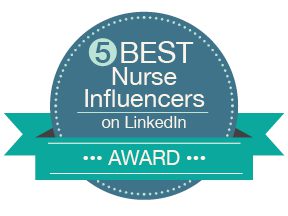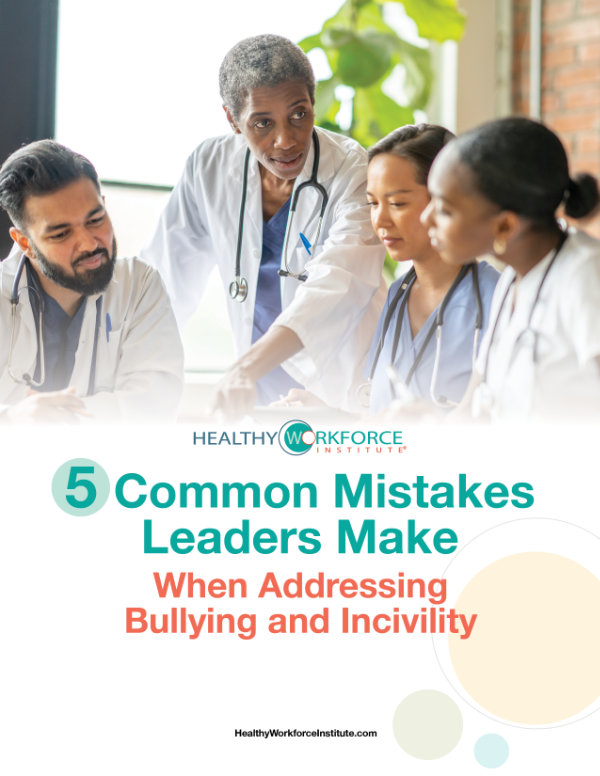I’ve spent the last 27 years as a nurse and have witnessed bullying behavior in every role I’ve held.
As a new nurse working at the bedside, a homecare nurse, an educator, and even at the executive level – I’ve experienced or witnessed bullying and incivility.
Nurse bullying is alive and well, exists in every role, and is present at every level.
I got to the point where I was no longer willing to accept nurse bullying as the norm, “Well, that’s just the way it is in nursing.” Therefore, I’ve spent the last 10 years DOING something about it!
I spend the majority of my time helping organizations put a stop to bullying in healthcare. Nurses from all over the globe reach out to me asking for help.
Over the years, I’ve learned a lot about bullying which I use to help others.
7 things you need to know…
-
They need targets to survive
Think about it. If everyone stood up to the bullies, they wouldn’t have anyone to bully! The only reason they exist is because they have targets to squash.
Starting TODAY, make the decision NOT to be a target. Speak up for yourself and immediately address any attempts to treat you poorly.
If you want to kick it up a notch, don’t let anyone else become a target either!
-
They tend to be really good at their job
One of the reasons why bullies are still employed, despite numerous complaints, is that they tend to be really, really good at their jobs. For a leader, it’s easier to justify, rationalize, or even defend bad behavior when it comes from your “best” nurse.
We do the same thing with providers. We tolerate their badness because they are sooooo good.
Starting today, stop saying, “He’s a great nurse…but…” or, “She’s a great physician…. but…”
We need to stop justifying bad behavior just because someone is competent.
-
They see the workplace as a battlefield
Bullies operate from a win-lose mindset and every day they get prepared for battle to win the war. If you’re their target, many times, you walk into an unsuspecting battlefield, and without warning, get attacked.
We also need to prepare for battle. Be on guard – always.
-
They like to keep their targets walking on eggshells
When working with a bully, their targets feel like they are walking on eggshells. Sometimes they’re nice and then whammy!
You let your guard down and they zing you. Just assume all attempts to be nice to you are fake.
-
They don’t play by the rules
They cheat, lie, and don’t play fair. The reason why we have so many targets in healthcare is because we are the “do-gooders” and play by the rules. Bullies don’t. Our ANA Code of Ethics provides a blueprint for clinical and professional behavior. Bullies chew up our code and spit it out.
Don’t expect them to play fair.
However, just because they don’t play doesn’t mean that you should follow suit.
Always be the consummate professional but don’t have any illusions about their integrity.
-
They have low emotional intelligence
Recently, someone suggested that I conduct a study with the bullies.
Actually, find out their perspective and perhaps uncover the reason they show up hell bent on making life difficult for others. The problem is, the bullies don’t actually think they’re the bullies! It would be extremely difficult to recruit study participants. It’s because bullies lack self-awareness, which is a key characteristic of emotional intelligence. Bullies don’t think they’re the bullies.
Stop spending time and energy thinking that they know exactly what they’re doing and how they come across. That doesn’t mean you ignore them. By using my confronting techniques such as “Name it”, “Script it”, and “Speak it”, you’re helping them to become more self-aware.
-
They may not be mentally healthy
Think about it. How could an educated, competent, licensed professional who is caring and compassionate to their patients, treat others with such cruelty? Something’s not right there. They may be suffering from mental health issues. That’s not to say that anyone who is cruel has a psychological disorder, however, we can all agree that they aren’t mentally HEALTHY if they can treat others with such cruelty.
Realize that you can do everything right but the bullies may still not be capable of adapting their behavior.
There are times that I wish I could go back in time to the first time someone tried to set me up to fail, or the first time I witnessed one of my colleagues being openly criticized in the middle of the hallway.
I wish I wouldn’t have been so naive every time I started a new role, thinking everyone would go out of his or her way to support me and then beat myself up when they didn’t.
I trusted strangers because we were nurses and I assumed all nurses would safeguard each other, like an exclusive club that members take an oath to honor, protect, and serve each other.
I wish I would have known then what I know now about bullies.
Because now I, and you, are more equipped to finally stop allowing nurse bullies to ruin our profession; of disgracing the honor of our sacred work; of forcing many of us out of the club.
We can and need to do better. Are you with me?














4 thoughts on “7 Things You Need to Know About Bullies So You Can Stop Them”
Renee, I am currently experiencing what I see as Professional Bullying. I am invovled with a grass roots organization trying to get a Bill passed in Congress and the Senate. It is a simple bill that will be good for nurses and the country. As always there is opposition. That is not the issue. The issue is how the opposition is playing. As I reviewed your tips I could check off two or three items that people are using…they don’t use facts, but are not using current information on how the Bill is written. In my view, they have been ‘mean’ and disruptive to those who support the Bill and it makes us all look bad. I would love to see some tips on how to address professional bullying so that as professionals we do not sink down to their level. Thanks for your advice.
I’m sorry to hear you’re going through this Anne. I’ve actually seen extreme covert bullying in professional nursing organizations, within boards, at the state boards of nursing, etc. It’s a shame but not uncommon. WE all need to do better!
Thank you for taking action against bullies. I’m dealing with a co-worker who gives me the “silent treatment”. When she does this I ask her if she’s ok, I try to engage her in conversation by asking her what’s for lunch. But I only get one word answers. I feel intimidated, stupid for allowing myself to feel intimidated and it causes me to be anxious. I go home wondering what I could do to make it better.
So much has gone on between me and this nurse. I don’t know if I can stay at this job much longer if permanent change doesn’t happen. Please help me.
Hi Ruth. Thanks for taking the time to comment. It’s so disturbing how many times I hear stories like yours, that a colleague uses the silent treatment at work. Think about the impact to patient care!! Have you tried calling her out on it by naming it? “Is there is reason why you’re giving me the silent treatment (or ignoring me)?” Name her behavior and when appropriate, link back to patient care. “I’m concerned about ___ patient when you ignore my questions…”
Oh, and this isn’t about you. Please try very very hard not to beat yourself up and spend energy worrying about what YOU can do better – this is not normal behavior!! Hope this helps!